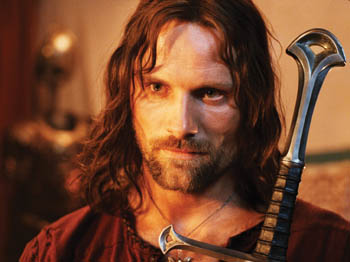![[Metroactive Movies]](/movies/gifs/movies468.gif)
[ Movies Index | Show Times | Silicon Valley | Metroactive Home | Archives ]

Photograph courtesy of New Line Productions Throne Home: Viggo Mortensen reclaims his kingdom in 'The Return of the King.' Ring Bearers Peter Jackson and cast carry Tolkien trilogy to grand finale in 'The Lord of the Rings: The Return of the King'
MAJESTIC is the word for The Lord of the Rings: The Return of the King, the much-anticipated last third of Peter Jackson's Tolkien trilogy. The multisided tale-telling of The Two Towers pays off here. Jackson turns from point to point of the endgame: every time he cuts, it's to something of interest. The film's center is Minas Tirith, "the white city," a gleaming cream-colored citadel: Mont-St-Michel, only new. A bone-white dead tree stands in the courtyard of its empty palace. Here, a political stalemate continues, as Gandalf (Ian McKellen) tries to rouse the steward Denethor (John Noble) to action. Jackson contrasts the Shakespearean decadence of these scenes with the innocence of the impulsive Pippin (Billy Boyd). In a weak moment, the hobbit signed up as a vassal to this vacillator. While crunching on a roast chicken, Denethor demands a song. Here Pippin has his first really important scene. As he sings, he's desperate, terrified to the point of tears by the siege drawing around Minas Tirith. The moment reminds us of that plaintive song in the final moments of Kubrick's Paths of Glory. Later, like all misrulers, Denethor decides to strike out when he's at his weakest: he demands a cavalry charge against an Orc-fortified position. The soldiers head off to die. The widows to be--their faces like the mourning women in a Giotto fresco--throw flowers to the riders, and the war horses trample the blooms under their hooves. This is, to put it mildly, good enough, even without the intimate drama of the weakened, maddened Frodo (Elijah Wood) and Sam (Sean Astin) as they ascend Mt. Doom, past a radium-green fortress in Mordor. The three have a side trip into the cobwebbed den of the "she" whom Gollum promised to feed at the end of The Two Towers. Once again, the wretched Gollum (voiced by Andy Serkis) is the most astounding piece of synthespianism in the movies. Jackson's twisted but touching creature pays tribute to Peter Lorre's guilty creeps. He even possesses Lorre's bulging eyes and lank hair. It was a stroke of genius to use Gollum's backstory as the point of entry into the film. The Return of the King starts at the point of the rediscovery of the cursed ring. From one moment of Cain and Abel violence comes the fall of kingdoms. There are a few flaws, probably signs of haste to complete this mammoth project. Note the bad stand-in for Ian Holm, who looks like a midget in a wig. Flying "fell beasts"--dragons--attack, dropping like hawks on the horsemen of Rohan. Jackson cuts to the beginning of the attack, instead of the moments before, when he could have increased the suspense. Another abruptly handled subplot is the squelched romance between the horse princess Eowyn (Miranda Otto) and the returning King Aragorn (Viggo Mortensen). Aragorn, you led that girl on! But Eowyn redeems the disappointment of her lack of battle scenes in The Two Towers. Her moment of triumph is another astute steal from Shakespeare, filched from Macduff's killing of Macbeth. Mortensen is every inch a king, the embodiment of power in the right hands. But Aragorn's lady love, the elf Arwen (Liv Tyler), spends the film languishing. Arwen never gets a chance to improve upon that smashing scene in The Fellowship of the Ring, when she gave the nine Ringwraiths a bath. Lastly, it's a letdown never really learning what was in it for Sauron. In Tolkien's book, a character called "The Mouth of Sauron" meets Aragorn's forces during the final battle. This spokesmonster gives a short speech of outraged sovereignty, in a style familiar from presidential press conferences. When the film comes to its finale, it's a little anticlimactic that Sauron remains as he has been: a baleful flaming eye, flickering wildly in defeat. Mostly, this is a war movie, capped by the battle of Pelennor Fields, an attack with hundreds of thousands of foot soldiers and monstrous war elephants. A tumor-ridden Orc leads the breaching of the gate at Minas Tirith, aiming an inconceivably large siege engine against the gates. Watching this astounding mayhem, I finally knew what those backward kids get out of Star Wars. Audiences don't expect shape from epic films. You can get away with murder if you have enough horses; Tom Cruise just did. Jackson's epic is deeper than the three books it came from. Tolkien was like the old model of epic-movie directors. He had a grand picture in mind but a chronic inability to illustrate the finer details. Jackson's not just playing with soldiers. He's also studying the faces in between the most immense sieges and charges and fantastic creatures. The Lord of the Rings was made on an island spared the worst of the world's industrialization, the way almost every other place on the planet has been changed, from pastures into Mordor. In essence, the trilogy comes out as a lesson to those who feel that technology is enough. The Lord of the Rings reminds the world of cinema of something important: without the human underpinnings, without taste and intelligence, all digital prowess is nothing more than a light show.
The Lord of the Rings: The Return of the King (PG-13; 201 min.), directed by Peter Jackson, plays valleywide.
Send a letter to the editor about this story to letters@metronews.com. [ Silicon Valley | Metroactive Home | Archives ]
|
From the December 18-24, 2003 issue of Metro, Silicon Valley's Weekly Newspaper.
Copyright © Metro Publishing Inc. Metroactive is affiliated with the Boulevards Network.
For more information about the San Jose/Silicon Valley area, visit sanjose.com.